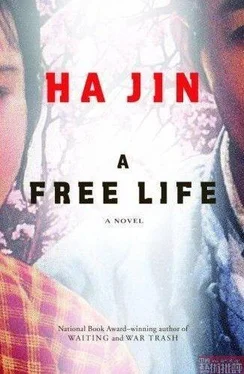" I see, your old mother is useless to you now. " She rose and shuffled away. Her shoulders sagged.
Nan rested his head on the back of the sofa and closed his eyes. The conversation saddened him. He remembered how the day before, when he mentioned Pingping's miscarriage, his mother had merely said, "If you're more filial to your parents, no misfortune like that will strike again." Those words still rankled him. Now how could he make her understand that she was no longer a member of his immediate family? How could he convince her that Pingping was the only person he could rely on? Greedy and vain, his mother just dreamed of making a fortune and showing off to her neighbors and friends. Ning had told him that their parents often bragged to others about going to America for a vacation and to see their grandson. His mother had even promised some friends of hers that she'd persuade Nan to help their children study in the United States when the kids grew up. As a result, many people had begun to ingratiate themselves with his parents. Nan realized that the old man and woman couldn't possibly commiserate with him and Pingping over the fear and misery they had gone through in America. How lonely he felt in his parents' home, as though he hadn't grown up in this very apartment. Perhaps he shouldn't have come back in the first place.
"I CANNOT imagine marrying a man younger than myself." That sentence, spoken by Beina sixteen years before, had been reverberating in Nan 's mind ever since he'd been home. In fact, she was just four months older than he. His memory of the proposal still stung him. Fat snowflakes had fluttered around as he proposed to her, saying he'd do everything to make her happy, including most of the household chores. He also promised her that they'd eventually live in a city south of the Yangtze River because she disliked the cold climate here. And with trepidation he waited for her answer. A few sleepy birds croaked in the treetops, whose branches had all caked into masses of snow. Her voice was flippant, which unsettled him, though he had steeled himself for the worst. When the final answer came, he felt crushed and wounded, leaning against the bole of a young birch crusted with ice. "I've got to go now. Good night," she said, and walked away, fading into the darkness. Tears, hot and unstoppable, coursed down his face.
If only he had cut his ties with her right then and there. But instead, he had returned to her later on and gotten enmeshed deeper and deeper in her maze.
For several days now he had been thinking about her. Has she been happy? What does she look like now? Like a middle-aged woman? That's unlikely. She always knew how to take care of herself. Does she still remember me? Does her husband, that fellow with a rabbit face, really love her? Would she like to see me? Will my reappearance disturb her? What does she do? Still working as a translator in the information office of the sewing machine factory?
He hadn't asked his siblings about Beina, and nobody had mentioned her either. But he was determined to see her before returning to America. He wouldn't expect to rekindle her feelings for him. All he wanted was to see her once more so that he could preserve her in his memory as a lovely woman beyond his reach, as someone who still possessed his soul, so that the flames of inspiration would blaze in him again.
On Sunday morning he set out for Daoli District, for Beina's home. He walked the entire two miles, first along Thriving Peace Street and then along Worker and Peasant Boulevard. The poplars on the sidewalks were twice as large as when he had last seen them, but most buildings alongside the streets were grimier as if coated with coal dust. Since coming back, he had taken some herbal boluses that helped relieve his allergy, so he could breathe normally now. He turned onto a small lane after he passed the sewing machine factory, which, according to one of the signs on the gate pillars, now manufactured motorcycles as well. He found Beina's bungalow easily, which was tucked away behind two rows of tenements and which he had thought might have been torn down. This Japanese-style house had appeared in his mind from time and time, usually surrounded by cherry blossoms and tulips, but now, standing before it, he saw only a few aspens that seemed to have withered. The grape arbor and espalier that used to shade the east side of the house were gone, replaced by a small garden grown with eggplants, bell peppers, tomatoes, fava beans. The large willow under which he had often watched Beina's window on the second floor looked ragged, as if it had been struck by lightning, its stringy branches floating in the breeze. He stood under the tree for a while to collect himself. Then with a throbbing heart he climbed up the brick steps and knocked on the door. He backed up a little, his stomach aflutter.
A noise came from inside, and a svelte young woman in a pastel sundress came out. She looked familiar, but Nan wasn't sure if he had ever met her. "Who are you looking for?" she asked in a voice full of sleep, her eyes fixed on him.
"Beina Su. This is still her home, isn't it?"
" Sure. Do I know you?"
"I'm Nan Wu."
The woman's eyes widened with a dreamy light. "Oh, I heard of you. Come in. I'm Beiya, Beina's half sister."
She showed him into the spic-and-span living room. Once he had sat down on a chintz sofa, she asked what he'd like to drink, tea or beer. The latter was a household beverage in Harbin, enjoyed by both men and women, even by children. "Just boiled water will be fine," Nan told her.
Having placed a cup of tepid water before him, she sat down and said, "So you went with Beina for some time, didn't you? In fact, she often mentioned you. Didn't you go to America in the eighties?"
"Yes, twelve years ago."
Nan scrutinized her face. Her little nose and thick-lashed eyes didn't resemble Beina's at all. A baby boy in blue open-seat pants was playing with a rubber ball in the room. He wagged his fleshy buttocks as he crawled and toddled around, chasing the ball. Beiya lifted him up and sat him on her lap.
"Your sister men-mentioned me?" Nan 's voice caught. He lifted the cup and took a gulp, the water reeking of chlorine.
"Yes. She said you must be a rich man by now."
"I'm just getting by."
"So you haven't met Beina in America?"
"What? You mean she's in the States too?"
"Yes, in Illinois."
"She's there alone?"
"No, with her family."
"When did she leave?"
"About five years ago."
"Oh, if only I had known." Stupefied, he suddenly felt drained. A strange emotion overcame him, as if he had been taken in. He asked for Beina's address and phone number, which her half sister jotted down for him with a red fountain pen. By her manner and knowing smile he guessed she knew Beina had once turned down his proposal. In her voice there seemed a touch of sadness and sympathy.
"How is she doing in Illinois?" he managed to ask.
"She complains a lot. She's working hard to support her family."
"In the beginning it's always hard. You have to struggle to put down roots in America. Usually it takes ten years to settle down."
" So you already have a green card?" "I'm naturalized."
"That's awesome. My sister hasn't got her green card yet."
"That shouldn't be difficult for her." He grimaced.
He wanted to ask more about Beina, but restrained himself. The baby was hungry and wanted to suckle, so Nan seized the moment Beiya turned to give her breast to her son and got up to take his leave.
On his way back he felt dazed, dragging himself eastward absent-mindedly. His hand patted the trunks of the poplars lined along the sidewalk as he passed them. Some pedestrians turned to look at him as if he were a lunatic. Approaching home, he forgot to enter the compound through the back alley. Instead, he walked into the front gate and even nodded at the people sitting in the guard office. One man recognized him and pointed him out for the others in the room. A few men gathered at the opened window to observe Nan, who was an overseas Chinese now. They whispered, "Look at his face, so pink. He must've drunk cow's milk every day."
Читать дальше












